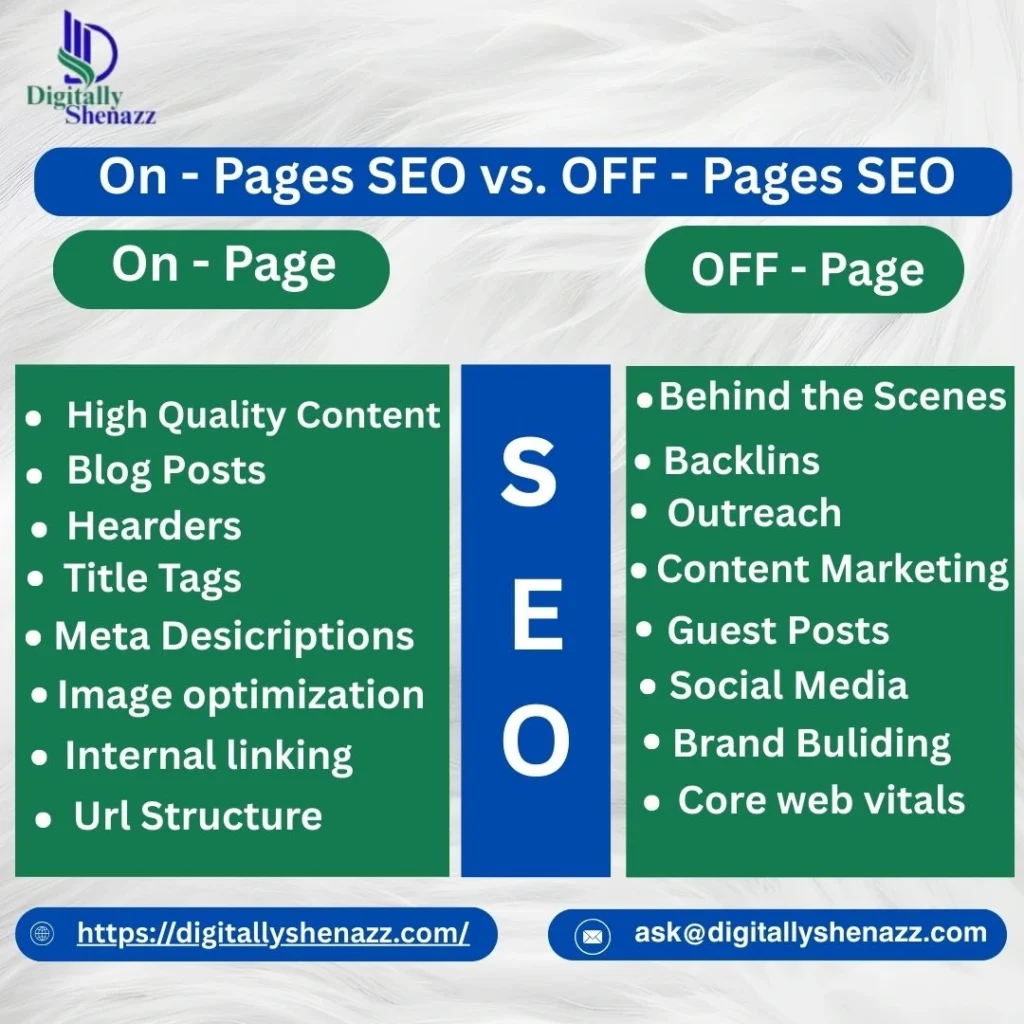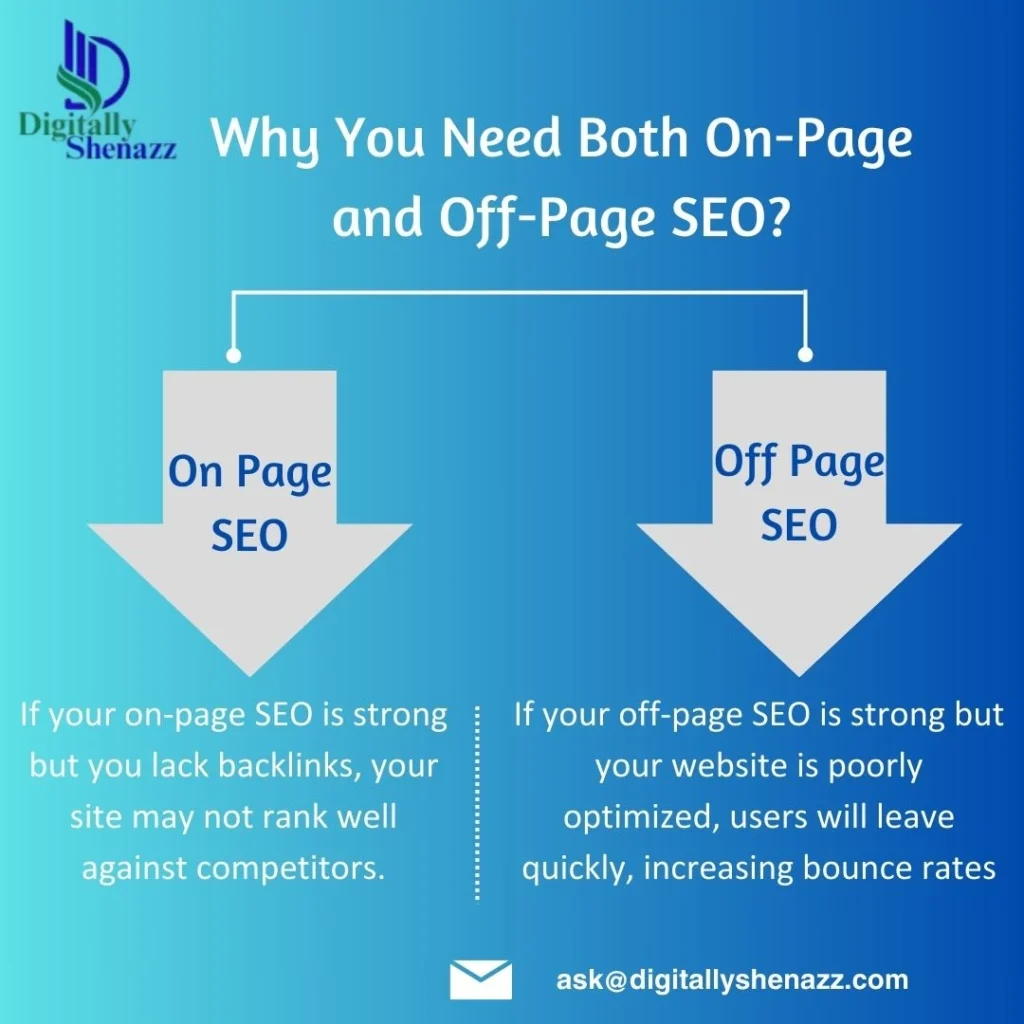In the world of digital marketing, on-page SEO vs off-page SEO has always been a hot topic. Both are essential for improving a website’s visibility on search engines like Google, but they work in very different ways. If you’ve ever wondered how some websites rank on the first page while others struggle to appear even in the top 50; the answer often lies in how well they balance these On-Page SEO vs Off-Page SEO strategies.
This guide will break down the difference between on-page SEO vs off-page SEO, explain why both are crucial, and share some on-page SEO techniques and off-page SEO techniques you can apply to boost your online presence. By the end, you’ll understand how these two aspects work hand in hand to strengthen your website’s authority, improve ranking, and attract more organic traffic.
What is on-page SEO?
On-Page SEO refers to all the optimization efforts you make within your own website to make it search engine friendly. Think of it as polishing your site from the inside. Search engines like Google analyze different elements on your pages content, structure, meta tags, URLs, and internal links to decide how relevant your site is to a user’s query.
Simply put, on-page SEO is about improving the quality of your website so that both users and search engines can easily understand and trust your content.
Why On-Page SEO Matters
- It ensures your content matches user intent.
- It helps search engines crawl and index your pages properly.
- It improves the user experience, keeping visitors on your site longer.
- It builds a solid foundation for other SEO strategies to work effectively.
What is off-page SEO?
If on-page SEO is about what happens inside your website, off-page SEO is about what happens outside of it. Off-page SEO includes all the strategies that help your site gain trust, credibility, and authority across the internet.
This is often achieved by building quality backlinks, increasing brand mentions, engaging in guest posting, and leveraging social media. Google sees these signals as votes of confidence from other sites, which improves your chances of ranking higher.
Why Does Off-Page SEO Matter?
- It boosts your site’s credibility and trustworthiness.
- Backlinks act as recommendations from other websites.
- It increases visibility across different platforms.
- Strong off-page efforts can help you outrank competitors, even if their on-page is optimized.

On-Page vs Off-Page SEO: Breaking Down the Differences
While both are essential, on-page SEO vs off-page SEO differs in how they achieve better rankings.
| Factor | On-Page SEO | Off-Page SEO |
| Focus | Optimizing elements inside your website | Building credibility outside your website |
| Main Goal | Improve content relevance and user experience | Increase domain authority and trust |
| Examples | Title tags, meta descriptions, headings, internal linking | Backlinks, guest posting, social media engagement |
| Control | Fully under your control | Dependent on external sources |
Together, they form a complete SEO strategy. You cannot rely on just one your website needs both to compete in today’s digital marketplace.
Essential On-Page SEO Techniques
To understand On-Page SEO vs. Off-Page SEO, let’s first look at some proven On-Page SEO techniques you should use:
Optimized Title Tags and Meta Descriptions
- Include your target keyword naturally.
- Keep it clear, concise, and click-worthy.
High-Quality Content
- Write content that provides value to your audience.
- Use your primary and secondary keywords strategically.
- Avoid keyword stuffing focus on readability.
Header Tags (H1, H2, H3)
- Use headings to structure your content.
- Insert keywords naturally into H1 and H2 tags.
Internal Linking
- Connect related pages within your website.
- This helps search engines crawl your site and reduces bounce rates.
Mobile-Friendly Design
With Google’s mobile-first indexing, responsive design is non-negotiable.
Page Speed Optimization
A fast-loading site improves user experience and ranking potential.
Image Optimization
- Use descriptive alt text with keywords.
- Compress images to improve speed.
By consistently applying these on-page SEO techniques, you improve your chances of ranking higher for your target keywords.
Essential Off-Page SEO Techniques
Now, let’s shift to the other side of the debate: off-page SEO techniques.
Backlink Building
- Earn backlinks from high-authority, relevant websites.
- Quality matters more than quantity.
Guest Posting
- Publish valuable content on reputable blogs.
- Helps build authority and drive referral traffic
Social Media Engagement
- Share your content across platforms.
- More visibility can lead to more backlinks
Influencer Marketing
- Collaborate with influencers in your niche.
- Increases brand awareness and credibility.
Online Directories and Citations
- Add your business to trusted directories.
- Especially important for local SEO.
Brand Mentions
Even without a link, brand mentions improve trust signals.
Content Marketing
- Create shareable, valuable content that naturally attracts links.
Using these off-page SEO techniques, you signal to search engines that your site is trustworthy and worth ranking higher.
Why You Need Both On-Page and Off-Page SEO?
When comparing on-page SEO vs off-page SEO, it’s clear that both play unique but equally important roles. Focusing only on one will leave your SEO strategy incomplete.

- If your on-page SEO is strong but you lack backlinks, your site may not rank well against competitors.
- If your off-page SEO is strong but your website is poorly optimized, users will leave quickly, increasing bounce rates.
- On-page ensures your website is optimized and user-friendly.
- Off-page ensures your website is credible and authoritative.
Common Mistakes to Avoid
When working on on-page SEO vs. off-page SEO, avoid these mistakes:
On-page SEO mistakes: keyword stuffing, duplicate content, ignoring mobile optimization, and missing meta tags.
Off-page SEO mistakes: buying low-quality backlinks, spamming forums, and ignoring brand reputation management.
The Future of On-Page SEO vs Off-Page SEO
SEO is constantly evolving, but one thing is certain: both On-Page SEO vs Off-Page SEO will continue to matter. With Google focusing more on E-E-A-T (Experience, Expertise, Authoritativeness, and Trustworthiness), optimizing your site internally and building external credibility will go hand in hand.
Future trends may include:
- More emphasis on AI-driven search optimization.
- Greater value is placed on high-quality, relevant backlinks.
- Increased importance of user experience and engagement metrics.
Final Thoughts
When it comes to on-page SEO vs off-page SEO, the debate is not about which one is better but about how to use both effectively. On-page SEO builds the foundation of your website by making it optimized, user-friendly, and content-rich. Off-page SEO boosts your site’s reputation and authority through external signals like backlinks and brand mentions.
By combining strong on-page SEO techniques with powerful off-page SEO techniques, you create a complete strategy that not only improves your rankings but also delivers long-term success in digital marketing.
If you want to dominate search results, don’t choose between them; master both. That’s the real secret behind SEO success.